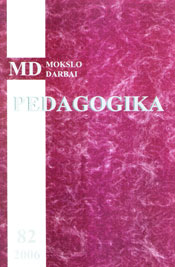Studijų akreditavimo proceso savianalizės etapas: akademinės bendruomenės požiūrio tyrimas
Self-Evaluation in The Process of Higher Education Studies Accreditation: Research of Academic Communitts Attitude
Author(s): Rima ZablackėSubject(s): Education
Published by: Vytauto Didžiojo Universitetas
Summary/Abstract: The paper focuses on the analysis of the experience of Lithuania and other European countries in the field of self-evaluation as a part of higher education accreditation process. The process of self-evaluation is typically seen as having a dual purpose in evaluation procedures: on the one hand, this process ends up with documentation; on the other hand, it forms the basis for continuous improvement. At the same time self-evaluation reports provide an interface between internal and external quality assurance processes. Therefore higher education representatives frequently mention that self-evaluation constitutes the most useful part of any quality assurance process, but only if it is followed up by concrete implementation. The team structure, the content of and approach to self-evaluation vary among different countries, but most of authors agree on the attitude that opinion of the whole academic community and external clients of higher education should be represented in the self-evaluation reports. The results of the research have shown that Lithuanian academic community members confirm the importance of the participation of teaching staff in the self-evaluation team, but the participation of students and graduates is seen as more important than the participation of administrative staff, social partners and representatives of professional organisations. Statistical analysis of the research data has helped to define an optimal composition of the self-evaluation report, consisting of five components: organization of learning / teaching process, external links, internal quality evaluation and assurance procedures, internal human and material resources, and accessibility of studies. It was noted that belonging to a certain academic community group has significant influence on the respondents’ attitude evaluating the importance of the self-evaluation report components. The results of the research have shown that internal quality evaluation and assurance procedures are seen as the most important components of the self-evaluation report and accessibility of studies is seen as the least important component.
Journal: Pedagogika
- Issue Year: 2006
- Issue No: 82
- Page Range: 42-50
- Page Count: 9
- Language: Lithuanian

